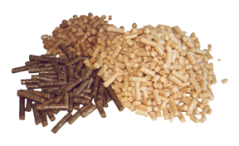What is Pellets?
Pellets are usually made from raw materials from forestry and agriculture, e.g. sawdust and wood chippings, often waste from the wood industry.
Pellets are a refined biofuel, dried and pressed into a cylindrical rod of compressed energy. The production takes place by pressing at high pressure, without the addition of binders. The chips have natural binders and therefore no additives need to be present.
Pellets are a refined biofuel that contributes to a long-term ecological society. A positive environmental aspect is that biofuels are renewable and part of the cycle. Burning with biofuels means that the substances that are removed from the environment are brought back. The amount of carbon dioxide formed during combustion is as large as the amount the trees use during their growth.
A domestic fuel such as pellets is less sensitive than oil to international politics and the position of currencies on the world market. Most of the raw material used for the production of pellets today is pure waste from the saw and carpentry industry.
Why you should use Pellets
Above all, Pellets are a biofuel and belong to the category of refined wood fuels. As it is renewable, it is also environmentally friendly.
Pellets do not contribute to the greenhouse effect and the burning of pellets adds the same amount of carbon dioxide as the trees used during their growth. It is therefore tax-exempt. Pellets are locally produced and a very cheap source of energy (for example, much cheaper than oil and electricity)
But above all, it is better for the environment to fire with pellets instead of wood.
Pellets are part of the natural cycle!


